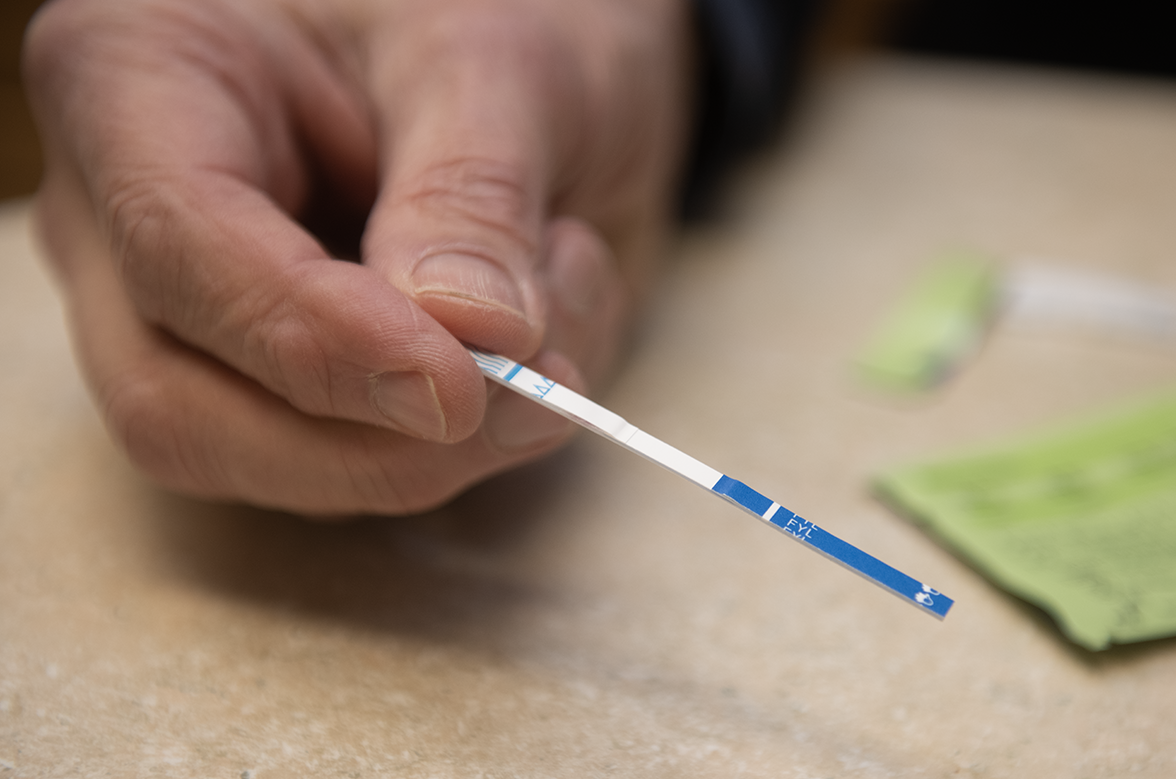To combat overdoses, Kansas lawmakers vote to decriminalize fentanyl test strips

Kansas lawmakers voted Thursday to decriminalize fentanyl test strips statewide, a move that has fulfilled a long-held goal for public health officials and a bipartisan group of legislators, who hope it can help stem the tide of overdose deaths.
Over 30 states have already decriminalized fentanyl test strips nationally, as the synthetic opioid, 50 times stronger than heroin, has taken hold nationwide. Because fentanyl is often cut into other drugs, advocates believe the test strips will help residents better know what is contained in the legal pain medications and illicit drugs alike.
In 2021, Kansas saw nearly 700 overdose deaths, a 6% rise over the same period a year prior. The Kansas Office of Vital Statistics reported that half of those deaths were attributed to fentanyl, a trend that is mirrored in most every other state in the country.
Historically, a bipartisan group of lawmakers in the House have been avowed supporters of the test strips, approving a bill to decriminalize them — alongside test strips for common date rape drugs — on a unanimous vote earlier this year.
"In the time we have not acted, people have died," Rep. Jason Probst, D-Hutchinson, a longtime advocate for decriminalizing the strips, said. "So I think it is time for us to get it done and prevent future deaths."
The measure was approved alongside a suite of other legislative items, including stiffer penalties for those who manufacture fentanyl and those who produce drugs designed to appeal to children.
Rep. Stephen Owens, R-Hesston, chair of the House Corrections and Juvenile Justice Committee, said he previously would have been skeptical himself but came around after talking with individuals with substance use disorders who said the strips "saved their lives."
"I think that's the goal for all of us, right?" Owens said in an interview earlier this month. "We want to give anybody that's struggling with a substance abuse addiction the opportunity to become clean, to turn their life around. And I think this is one small item that we can do that will help maybe one, maybe hundreds of people, stay alive another day to turn their life around.
Historically, however, the idea has received pushback from Republicans in the Kansas Senate, who voted to nix the item last year.
The bill passed narrowly Thursday, but not before an admonition from Sen. Kellie Warren, R-Leawood, that "there is no safe way" to use drugs.
Sen. Mark Steffen, R-Hutchinson, said "the only explanation" for the rise in overdose deaths "is a wide open border with drugs pouring across."
"While fentanyl test strips are the panacea of today’s herd mentality, the reality is unintended consequences," he said.
The 2023 legislative session brought more success, however, as harm reduction advocates and public health officials ramped up their efforts. Gov. Laura Kelly touted the idea in her State of the State address and had called on lawmakers to pass the bill.
Brandy Harris began advocating for the decriminalization of fentanyl test strips after the overdose death of her son, Sebastian, who initially became addicted to opioids after being hit by a car as a 13-year-old.
Sebastian had gotten clean, found a girlfriend and a job and shared a video from the comedian John Oliver supporting fentanyl test strips shortly before his death from an overdose last year.
Harris decided to pick up the baton of activism from that point forward.
"Everybody knows somebody who has passed away from fentanyl right now," Harris said in an interview earlier this year. "It is just so rampant. People have been so supportive of me and everything that has gone on right now because they realize, hey, maybe it wasn't his fault. Maybe he wasn't intentionally doing this."
Research has found that the strips are generally effective.
A team of researchers at the Brown University School of Public Health found drug users in Rhode Island who employed the strips were less likely to overdose and 95% of those studied said they wanted to use test strips again.
Meanwhile, a similar study in North Carolina found over three-quarters of individuals who used the strips reported feeling more secure as a result. A little under half said they ultimately changed their drug use patterns.
This article originally appeared on Topeka Capital-Journal: As fentanyl hits Kansas, lawmakers decriminalize testing strips

